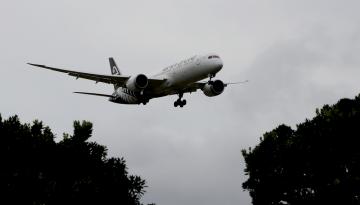An infectious diseases expert has warned against assuming a negative test for COVID-19 means you're free of the disease - and says we could see a rebound in cases under levels 2 and 3.
Air New Zealand on Wednesday announced it would start testing asymptomatic staff members just in case they have SARS-CoV-2, the deadly virus behind the pandemic which has left 183,000 people dead around the world, including 12 Kiwis.
The same day, the airline confirmed 30 of its staff members had caught the COVID-19 - not all of them air crew.
Despite this, Air NZ crews are exempt from the usual 14-day quarantine requirements, unless they've been to Los Angeles, where researchers recently found evidence the disease could be much more widespread than official figures suggest.
With community transmission in New Zealand appearing to be extremely low, epidemiologist David Murdoch of the University of Otago says keeping the border tight is vital.
"Anything at the border is just absolutely vital... It may be impractical for international air crews to have that two-weeks standdown, but certainly for others, that's really important."
Diseases like measles have been eradicated from New Zealand, and new outbreaks only happen when somebody carrying the virus brings it in. New Zealand is one of only a handful of countries in the world within reach of doing the same for COVID-19.
Dr Murdoch said if we're going to have any flights at all in and out of New Zealand, it wouldn't be pragmatic to require staff to go into 14 days of quarantine every time they touched down. But current testing methods can't entirely be relied upon to detect the virus.
"A negative test doesn't rule it out... If somebody was exposed to the virus and they did pick it up, there is a period of time where they would test negative until the disease progresses and they start developing symptoms - and just before then, the test would probably become positive," he explained.
"So you get a false sense of security... that's why there's been a lot of discussion around whether to test or not to test asymptomatic people... a positive test, yes, we would say that's almost certainly COVID - a negative test wouldn't rule it out."
The virus appears to attack several parts of the body, but is particularly aggressive when it gets to the lungs. The current tests take a swab from the upper airway tract, but Dr Murdoch says it only lives there a short while.
"Then it migrates down and lives in the lower airway - and the swabs that we use can't access that. A much better test would be to get the flem out, but many people don't cough up flem so it's just not possible."
In one case, he said four members of a family tested positive, but a fifth who ended up in hospital with the disease tested negative five times, before they were able to confirm it by testing flem.
"They had a pretty good suspicion right from the get-go, but it took a lot of effort to diagnose it."
Dr Murdoch also warned against getting complacent as the country eases up on some of the tougher restrictions we've had for a month to combat the spread of COVID-19.
He said it's "possible that we'll find that cases pick up again as we go down the levels".
"Going to level 3 and then presumably level 2, that's in fact the most dangerous time. That's the time when we may see a surge of cases. If it all goes perfectly then we might find that we eliminate it - that would be a fantastic result."
Hospitals have been relatively empty of late, with social distancing and other measures successfully flattening the curve of COVID-19 cases, as well as fewer car crashes and not as many people injuring themselves.
Michael Maze, also of the University of Otago, said people need to be aware going to level 3 doesn't mean we're in the clear - but hospitals have used the lull wisely.
"There's been a huge amount of preparation that's gone on. We are much more prepared than we were a month ago - I think we're in a pretty good space," he told Newshub.
"The four weeks has allowed us to get through a lot of that change without having to deal with a surge of cases. I think that compares and contrasts well with the US and UK, where they had to make all their adjustments at the same time they're dealing with an influx of people. That's really challenging."
Dr Murdoch said it's important to keep the load off the health system for now.
"We've still got to be practising really good behaviour, we've still got to be staying safe, and wherever possible staying in our bubble."



